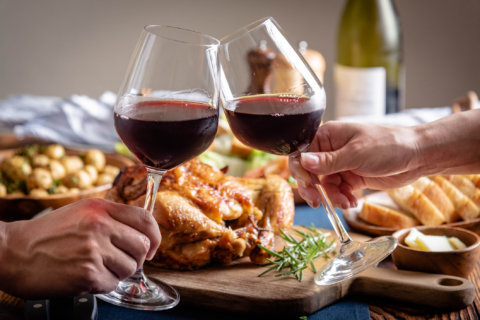As it is, holiday gatherings with loved ones can be a careful dance of dodging landmines on the way to wonderful memories — and this year, we are adding potentially explosive conversations around vaccination status.
About 58.5% of the United States is fully vaccinated against Covid-19, according to the US Centers for Disease Control and Prevention. Many experts say that vaccination is the best way to protect against the virus and slow or stop the spread, but much of the population still has hesitation.
In some cases, people have outright objections to being vaccinated.
The difference in vaccine stances can complicate family and friends gathering for holidays, even for those who are getting their shots. Children under 5 years old are not yet able to get vaccinated, kids ages 5 to 11 are not yet fully vaccinated, and even those who have had both of their shots risk breakthrough infections.
“Think about your vaccine as a very good raincoat,” said CNN Medical Analyst Dr. Leana Wen, an emergency physician and professor of health policy and management at the George Washington University Milken Institute School of Public Health. “If you are going out into a drizzle, you’re probably going to be well protected and not get wet.
“But if you’re going into a thunderstorm, there’s a higher chance of you getting wet, despite that very good raincoat.”
The different stances raise new questions this season: Should you go to a holiday with unvaccinated loved ones? Will they respect your boundaries? How do you have a safe and loving holiday if seeing them is worth the risk?
Whether to go at all
When making the decision whether to gather, there are both medical and social considerations to take into account, experts say.
First is the medical risk you and your loved ones face. In assessing your own risk, it’s important to think about the level of infection in your loved ones’ communities, Wen said. Then look at if they are taking other precautions like avoiding crowds and wearing masks indoors, she added.
“A third thing I would look at is how vulnerable are you, the person making this decision, and the people in your immediate household?” she said. “If you are fully vaccinated and you’ve got your booster and you’re generally healthy, the chance of you having a breakthrough infection that lands you in the hospital is relatively low.”
It’s also important to look at the social dynamics of the gathering, said Roseann Capanna-Hodge, a psychologist based in Connecticut.
If you are hosting the event, you have more of a right to dictate the conditions of the environment, but as the guest you may have to be more delicate, Capanna-Hodge said.
“What is the host doing? What boundaries are they setting? Why are you going to Uncle Bob’s house where nobody believes in vaccines? They don’t even think it exists,” she said. “That’s not really a great choice.”
Looking at how family and friends have treated difficult conversations and conflict in the past can give you a good sense of whether you can respect one another’s differences around vaccination.
“Do you feel confident enough for you to be there with your mask on?” Capanna-Hodge asked. “If you think this is going to be a volatile conversation, you don’t have to choose to go.”
Remember two things when making the decision, she said: Trust your gut, and remember that you do not have to attend.
“I think people feel they do, so they override their common sense that they know this is not going to be a good situation, and they still hope for the best — but there are no boundaries,” Capanna-Hodge said.
How to set boundaries
Boundaries can get a harsh, cold rap, but they are in fact a useful and loving tool, Capanna-Hodge said.
“Boundaries are about creating a safe space for everyone to understand what’s going on,” she said. “One of the biggest reasons why people have hurt feelings is they don’t say what they expect.”
You may not be able to set the rules for how the gathering will go, but you can set boundaries ahead of time about what conditions need to be met for you to feel safe enough to attend.
Capanna-Hodge recommended avoiding apologizing when setting a boundary but using light humor, a kind tone and body language to ease friction.
If a relative assures you that dinner will be outside or that masks will be worn, and you get there to find that is not the case, you can lovingly leave, she added.
Capanna-Hodge modeled how you can bow out without starting a conflict: “We love spending time with you, and I also recognize that you want connection so much, and it’s not as important for you to wear a mask or follow procedures, but for us it is. Love you, want to see you, how about coming over to our house (another time)?”
Leading with care can give you a better shot at leaving tension-free, but some people will be upset at your boundary enforcement no matter what you say, she added.
“Certainly, you can validate their feelings, like ‘I see that you’re upset — that was not my intent. I love and care about you. … We’ll talk tomorrow but we’re going to head out.'” Capanna-Hodge said. “And just let it go. You can love each other from afar.”
How to gather safely
After so much time apart, there may be family and friends with whom it feels worth the risk to spend the holidays.
Perhaps you are hosting and can set the scene, or they are willing to accommodate your safety concerns. The next question is how do you make the gathering as safe as possible?
“The safest thing to do is be outdoors,” Wen said, adding that people should use masks if they have to go inside to the restroom.
As we move into winter, however, not every part of the country can comfortably accommodate an outdoor dinner.
In those cases, people can make an indoor gathering as safe as possible by asking attendees to reduce their risk of infection as much as possible the three days before — meaning limiting trips to the public places, masking when they have to be out and avoiding socializing with others indoors — and then taking a rapid test the morning of the holiday, Wen said.
“Understand that risk exists, especially if there are unvaccinated individuals in an area of the country with high coronavirus transmission,” she added.







